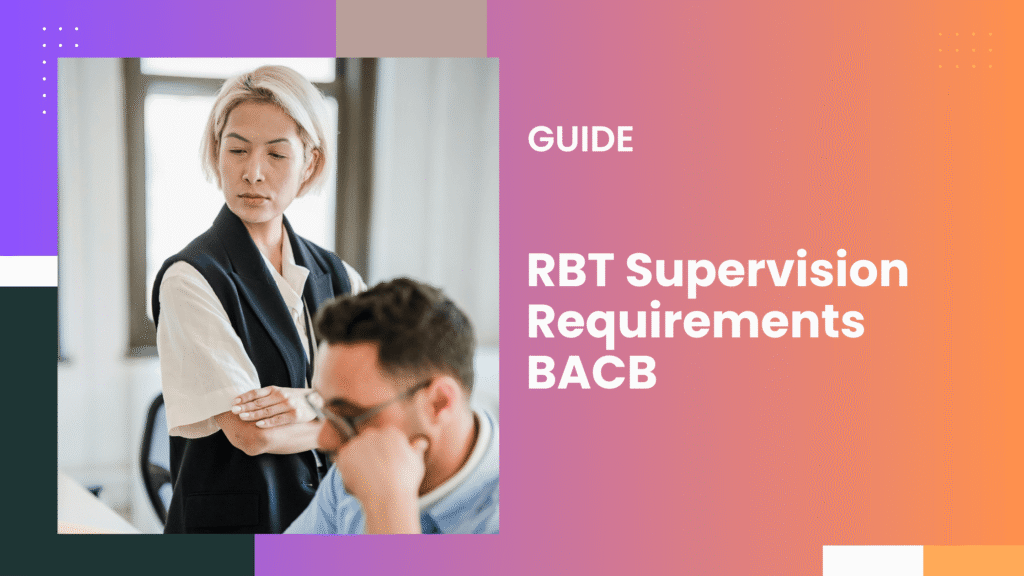RBT Supervision Requirements Toolkit | BACB Eligibility 2025

BACB RBT Supervision Requirements Include ongoing minimum 5% of hours monthly, including observation, performance feedback, ethics review, and documentation.
To supervise in RBT, let’s clear the air, as it can feel confusing, but it doesn’t have to.
Here’s the thing: staying supervised is absolutely necessary to keeping your certification active, protecting clients, and making sure you keep growing your skills.
RBT® Supervision Toolkit
Everything you need: 5% calculator, compliance checker, session log, supervisor eligibility, and monthly planner.
Hours Calculator
Rule of thumb: Minimum supervised hours = 5% of total. At least 2 contacts / month and 1 live observation.
Status
Add Supervision Entry
We store entries temporarily in your browser (no server). Export regularly for your records.
| Date | Start | End | Hours | Type | Client | Notes |
|---|
Supervisor Eligibility Check
What counts as supervision?
- Direct: live observation with feedback.
- Indirect: meetings, data review, ethics, documentation.
- Document date, start/end, type, skills, clients. Keep records ≥ 7 years.
Auto‑Plan Your Two Contacts
Tip: schedule early (week 1 & 3) to avoid end‑of‑month crunch.
Why Supervision Even Matters in RBT?
Supervision is more than a box to check as you’re working directly with clients, from a wide range such as changing behavior, teaching new skills, and supporting families.
That’s a big deal.
So, having a BCBA or BCaBA on your team means you’ve got someone making sure everything is safe, effective, and ethical.
Without consistent supervision, you’d risk:
- Bad habits creeping in
- Missing important program updates
- Putting clients at risk
- Losing your certification
A BCBA on Reddit summed it up perfectly:
“I don’t want my RBT working alone, no matter how skilled. Supervision is what protects the client AND the staff.”
Who Can Supervise You?
To become a supervisor in RBT, he/she has to meet these standards:
- They’re a BCBA, BCaBA, or a qualified licensed professional
- Completed the 8-hour supervision training required by the BACB
- Officially listed as your supervisor with the BACB
Heads-up: I just found out that starting in 2026, only BCBAs or BCaBAs will be allowed to supervise and so make sure you’re working with the right folks.
How Often Do You Need Supervision?
Every month, you have to hit these minimums:
- At least 5% of your total ABA hours must be supervised
- At least two supervision contacts per month
- One of those contacts has to be a live observation where your supervisor sees you working with a client
For example, if you deliver 80 hours of therapy a month.
That means you’ll need at least 4 hours of supervision, including one direct observation.
What Counts as Supervision?
Technically, you’ll usually see two kinds of supervision, which are direct and indirect.
- Direct — In this instance, your supervisor will be watching you run a session and give feedback on the spot, maybe model a skill.
- Indirect — For this one, it might look like team meetings, going over data, talking through ethical dilemmas, or reviewing your notes.
When I scour the internet and research on forums and blogs, Plenty of RBTs on Reddit have shared stories about supervisors just “checking in” for a few minutes on Zoom, then signing off.
But that’s not enough.
Good supervision should feel supportive, collaborative, and honest.
Documentation Rules You Can’t Ignore
There are a few things that every supervision contact needs to be documented such as
- Date
- Start/end time
- Type of supervision
- What skills or goals were covered
- Which clients were involved
By the way, your supervisor has to keep those records for at least 7 years.
So, just in case you ever get audited, sloppy paperwork can cost you your credentials, so don’t skip those sign-offs.
Real-World Challenges (And How to Deal With Them)
I’m gonna share a few Reddit and forums’ info from real experience in the field.
Scheduling chaos: You might have a supervisor with a full caseload, making it hard to get your observation done. The fix? Schedule early. Don’t leave it to the last week of the month.
Working across multiple clients: If you bounce between homes or clinics, keeping track of supervision hours can be a pain. I’ve seen folks use Google Sheets to log hours in real-time — it works like a charm.
Shallow feedback: Some supervisors barely check your work. You deserve more than that. If your feedback feels rushed, speak up. Supervision is there to help you get better, not just rubber-stamp your hours.
A Reddit user shared:
“My supervisor only calls me once a month for five minutes. I started asking for role-plays and more feedback. It made a huge difference.”
That’s the way to advocate for yourself.
Maintaining Certification Long-Term
This is not a one-time done deal type of situation. If you wanna stay certified, it means you keep up with supervision month after month. Here’s the big picture:
- Monthly supervision stays at 5% minimum
- Renew your RBT every year (though BACB plans to move to 2-year renewals soon)
- Complete a Renewal Competency Assessment
- Stay current on ethics code updates
I don’t want you to go more than 90 days without an approved supervisor; if you do that, you’re no longer an active RBT.
That can mean retaking the competency assessment or even the whole exam, so you need to stay on top of it.
Tips for Making Supervision Work for You
Here’s what I’d tell you if you were my best friend trying to stay on track:
- Get it scheduled early — aim for week 1 and week 3 each month
- Be prepared — bring your data, questions, and any tricky cases
- Push for quality — don’t settle for five-minute phone calls
- Track everything — I mean everything, including time stamps
- Communicate — keep your supervisor in the loop on schedule changes
My personal advice would be that if you stick to these supervision rules, you’ll protect your certification, keep your skills sharp, and deliver the best possible care to your clients.
That’s what matters most.






